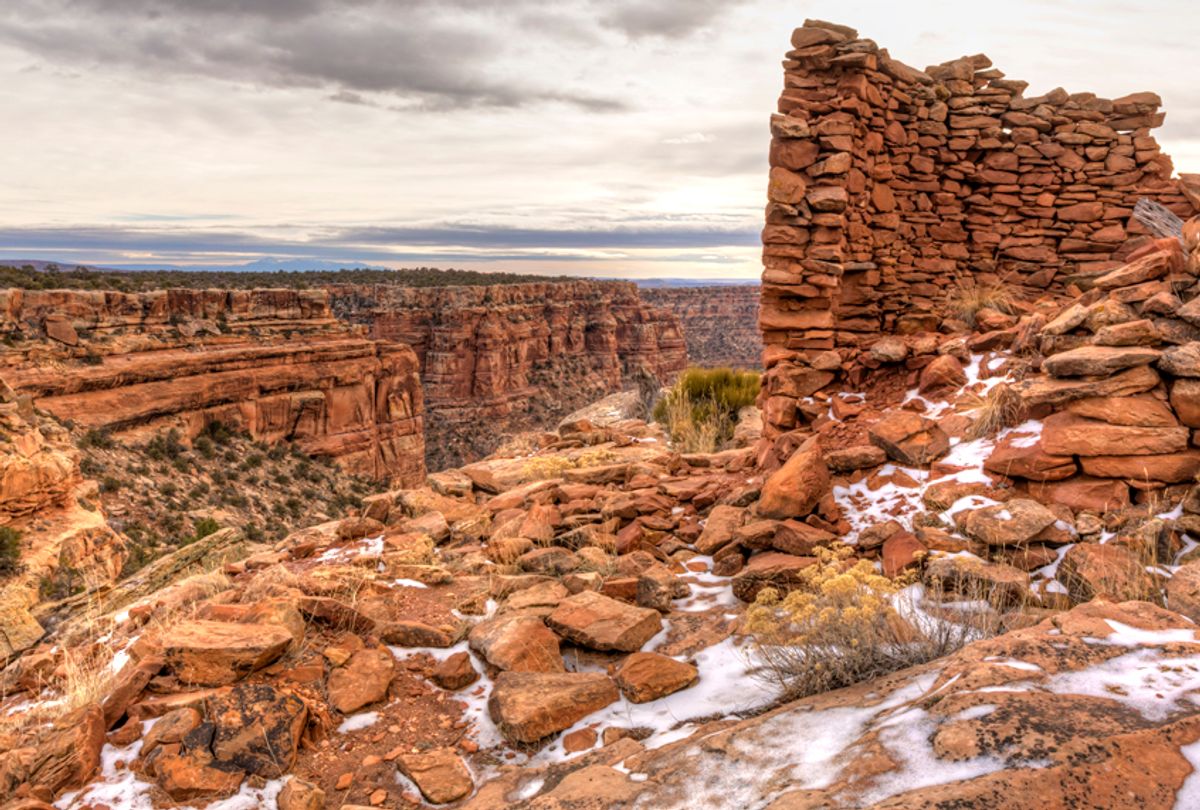Shortly after President Donald Trump signed two proclamations Monday announcing his administration's intent to greatly reduce the amount of protected land in the Bears Ears and Grand Staircase-Escalante National Monuments in Utah, a new series of images took over outerwear brand Patagonia's website and its social feed.
"The President Stole Your Land" was written in large-font type. Below, the company continued, “In an illegal move, the president just reduced the size of Bears Ears and Grand Staircase-Escalante National Monuments. This is the largest elimination of protected land in American history.”
This is the largest elimination of protected land in American history.
Take Action: https://t.co/biZPxo7PHh#BearsEars pic.twitter.com/OqW9FHPk3Q— Patagonia (@patagonia) December 4, 2017
For many Americans concerned about the future of our precious natural resources, the environment and the increasingly unchecked, mutually beneficial relationship the Trump administration has with corporate industry, it was the right thing to hear at the right time to hear it — an angry, defiant statement of values in exactly the place where a similarly inclined consumer shopping for their children's Christmas gifts might see it.
Perhaps as designed, the graphic and accompanying social posts went viral, with many praising the company and Patagonia CEO Rose Marcario for taking the White House to task. Another outerwear and equipment company, REI, also sent out similar — if somewhat less fiery — messaging, following the administration's announcement.
Already several groups, including National Congress of American Indians, Pueblo of Zuni, Ute Mountain Ute Tribe and Navajo Nation seem to be embarking on legal action against the administration in connection to this decision. Patagonia itself seemed to be spoiling for a court fight.
Naturally, there has been some blowback from the right, but also from the left. Credibly, some have noted that Patagonia and Marcario were, at the end of the day, corporate, capitalist figures and that — despite its messaging — the company's campaign did serve to promote and help the brand (at least in the eyes of left-leaning customers).
Yes, both Marcario and her company have been generally consistent and thorough in their support of environmental causes and criticism of the worst parts of the GOP agenda (they've assailed specific politicians, platform planks and bills in the past). There's no denying, however, that Patagonia is a for-profit enterprise and that, for all the good it does, it exists to make money. In its efforts to do so, Patagonia contributes to the industrialization of the environmental tourism trend which, in itself, can pose a threat to some of the very national monuments it seeks to protect.
This complicates matters, but it does not put the company or its CEO on the wrong side of the issue or of history here. The administration's decision to open up 1.98 million acres of protected lands, some of which are home to endangered species and unique, delicate natural wonders, to potential commercial development is alarming, to say the least. This one action, as well, speaks of worse to come. No one should be criticized for bringing attention to that.
Still, it's a difficult balancing act between commercialism and progressive advocacy, one more and more companies seem to be attempting. From Patagonia, to Keurig, to Volvo, to Penzeys Spices, brands and corporations have been reacting to various elements of the Trump agenda or pursuing their own progressive values more and more as the administration ramps up its efforts. It is, one must hope, a positive thing, in balance.
Yet, in the most general terms, many corporations are new to being crusaders for, instead of against, the disenfranchised. Moreover, it's a new thing for progressives to be in the position of having to work on the same side of the line with them.
In recent decades, the left has not looked to the private sector for guidance or leadership. Yet, through individuals such as Jeff Bezos and Bill Gates, or companies such as the above, the left is receiving more and more offers.
There will, at some point, have to be a moral reckoning about this new and unsettled situation. How can environmental activists partner with a company that, at the end of the day, is a participant in the world of commerce that has helped imperil the environment? How can progressives ally with a company CEO whose warehouses are often filled with troubling labor policies? Will these companies be able to put morals and ethics above shareholder interests? Maybe corporations are happy to snuggle down with their new strange bedfellows on the left, but it's sensible for progressives to be wary, even creeped out, by their new partners here.
Patagonia's was a nice message and a righteous stand for a nice cause. Until the left irons out its suddenly blooming relationship with corporate progressive advocates, it's hard to begrudge them if it helped sell a few extra fleeces.



Shares